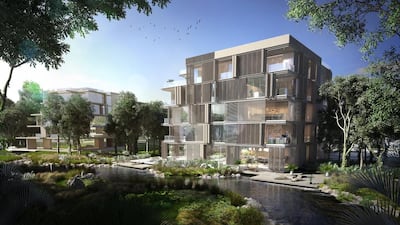With sleek white blocks seemingly suspended in mid-air, some of the latest flats being marketed by the Dubai luxury developer Al Barari appear to be missing one vital component — walls.
The chichi private developer, which owns some of Dubai’s biggest and most luscious private gardens, last week started sales on its latest planned development — Ashjar at Al Barari.
Arabic for “trees”, some of the homes of Ashjar have been designed with no visible barriers between their large open sitting rooms and the tropical gardens which surround them.
The computer generated images drawn up by the architects show stark lines on an open format conjuring up comparisons with footballer George Best’s famous glass fronted house in Manchester.
Ranging from one to three bedrooms, prices start at Dh3.5 million for a residence of just less than 2,000 square feet.
While some might find it a little unnerving — living in a home much of which is open to the elements — the company says the feature has already attracted dozens of buyers to its scheme.
“We like to blur the distinction between interior and exterior in our designs,” said the Al Barari chief executive Mohammed Zaal. “We are very proud of our beautiful gardens. They really provide a unique selling point to Barari.
“These are not blocks of flats. We don’t know what to call them. They are the size of villas but not separate.
Al Barari — owned by the Zaal family, which also owns the nearby Farm organic restaurant and the Greenworks nursery — is selling 300 homes at its luxury development close to Dubailand at the latest phase in its ambitious garden wilderness project, which eventually will include organic shops and restaurants, art galleries, hotel rooms, a spa and a Thai-style floating market.
Barari says that the homes are divided into three different designs –the open flats that include large terraces and few visible outer walls; another type that is designed to be more private rooms that are hidden behind shiny modern lattice work; and a third that blends the two other types.
In January the company relaunched off-plan sales for its Seventh Heaven block of 157 off-plan apartments after putting plans on hold for four years during the global financial crisis. The company says that the scheme is now 95 per cent sold.
lbarnard@thenational.ae
Follow us on Twitter @Ind_Insights

